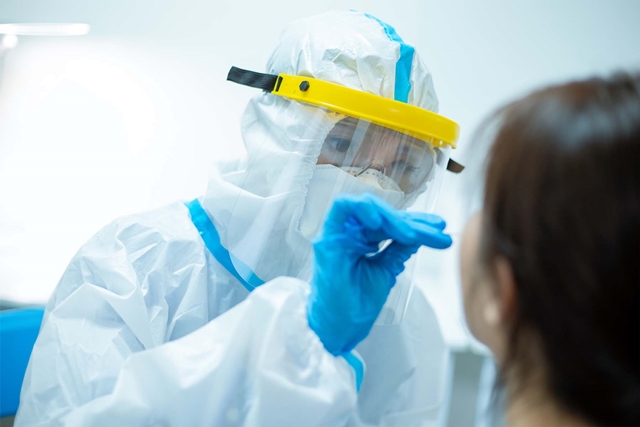9 Oct. 2020. A new technology makes possible simultaneous analysis of diagnostic specimens from thousands of individuals revealing the presence of SARS-CoV-2 coronaviruses. The SwabSeq process, developed by researchers at UCLA medical center in Los Angeles and the start-up company Octant Inc. in Emeryville, California received an emergency use authorization earlier this week from the U.S. Food and Drug Administration.
The RT-PCR test is the so-called gold standard diagnostic for SARS-CoV-2 coronaviruses responsible for Covid-19 infections. RT-PCR stands for reverse transcription – polymerase chain reaction, a type of genetic analysis, in this case for the viral RNA signature indicating SARS-CoV-2 in respiratory fluid samples. Those samples are often taken with nasopharyngeal swabs inserted through the nose to the back of the throat. The specimens need to be individually identified, sequenced, and tracked through the testing and reporting process back to the patient.
SwabSeq makes it possible to simultaneously analyze up to thousands of specimen samples, by removing one of the more tedious and time-consuming steps in the RT-PCR method. In the SwabSeq process, a unique molecular identifier is attached to each sample at the very beginning, which applies to all subsequent analyses. This molecular bar code allows for individual samples to be combined and analyzed in batches, since the samples and their genetic sequences are individually identified. UCLA says the process returns accurate individual results in 12 to 24 hours.
The SwabSeq molecular bar coding method is an off-shoot of a technique developed by Octant Inc., a drug discovery company spun-off from UCLA earlier this year. Octant’s technology combines synthetic biology, genomics, and computational tools to discover new drugs, and uses genetic bar codes applied to chemical-receptor interactions to enable its complex analytical processes to screen for new therapeutics among whole libraries of candidates.
FDA’s emergency authorization grants permission to UCLA’s microbiology lab to use SwabSeq for analyzing sample specimens for SARS-CoV-2 viruses. The authorization applies to specimens taken from a variety of nose and throat samples, not just the nasopharyngeal swabs used most often. UCLA says SwabSeq also works with saliva samples, but those are not covered in the FDA authorization.
While FDA’s authorization applies immediately to UCLA’s own lab, the document spells out conditions for authorizing other labs to carry out SwabSeq analyses. Those requirements include labeling, record keeping, performance tracking (false positive and negative), fact sheets for health care providers and patients, and reporting to public health authorities.
Sri Kosuri, a chemistry professor at UCLA and co-founder of Octant, says in a UCLA statement, “UCLA has been at the forefront of taking SwabSeq from an initial technology to validating its use in large-scale testing of real patients. We jump-started a whole community of researchers now using the technique to help bring people back to work and school.”
Jonathan Flint, the UCLA psychiatry and bio-behavioral sciences professor that submitted the emergency authorization request to FDA adds, “The sequencing technology is able to fill the gap in Covid-19 testing, particularly for the asymptomatic population, because it doesn’t have the same supply chain bottlenecks that have limited further expansion of current clinical PCR testing.”
More from Science & Enterprise:
- Wireless Sensor Detects Multiple Covid-19 Indicators
- Study Testing Wearables Data for Covid-19 Clues
- Univ Lab, Company Developing Phone-Based Virus Sensor
- Point-of-Care Covid-19 Diagnostic Shows High Accuracy
- Hospitals Testing Fast Covid-19 Diagnostic
* * *


 RSS - Posts
RSS - Posts
You must be logged in to post a comment.